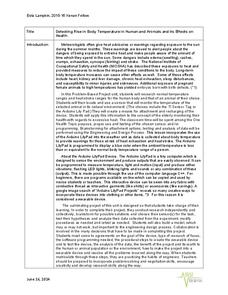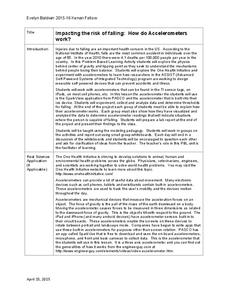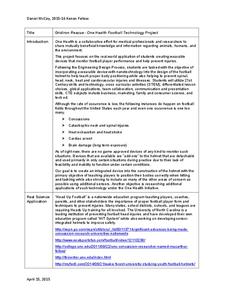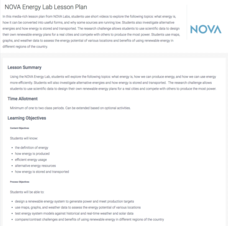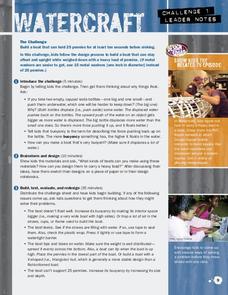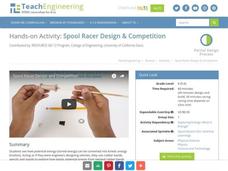DiscoverE
Build a Roller Coaster
Let the good times roll as young thrill seekers build a roller coaster on school grounds. Future engineers design and build a roller coaster from flexible tubing. The roller coaster is for a marble, so there will be plenty of room to let...
DiscoverE
Build a Straw Bridge
Build teamwork skills while building a bridge. Scholars work together in groups to create a bridge out of 20 straws and tape. There is a minimum span length of 25 centimeters, but otherwise, let creativity run wild.
DiscoverE
Critical Load
Help your class master the important concept of critical load. Pupils work together to build a structure using 12 playing cards. They test the critical load of the structure using pennies or paper clips.
Kenan Fellows
Engineering Skills Through Problem Based Learning
Navigate the ups and downs of learning about energy. Future engineers consider how potential and kinetic energy apply to roller coasters. They design a roller coaster of their own and then use computer design software to showcase their...
Kenan Fellows
Detecting Rise in Body Temperature in Human and Animals and its Effects on Health
Beat the heat using sensors. Scholars research normal body temperatures for humans and a specific animal. In groups, they create sensors that monitor body temperature, as well as the weather. The goal is to reduce the occurrence of heat...
Kenan Fellows
Impacting the Risk of Falling: How Do Accelerometers Work?
Young engineers consider how to apply accelerometers and sensors to help prevent falls in elderly people. They consider forces of motion and gravity as part of the engineering design process.
Kenan Fellows
Gridiron Rescue: One Health Football Technology Project
Helmets not included! Scholars brainstorm adjustments and sensors to football helmets in an engineering design project to help prevent injuries, such as concussions and spinal injuries.
Kenan Fellows
Evaluating Sensors and the Impacts of Physiological Stress: Designing a Wearable Device for Rescue Workers
A long-term project has scholars consider ways in which sensors help monitor physiological stress levels of rescue workers. They design and create a portable device for this purpose. Techies to the rescue!
PBS
NOVA Energy Lab Lesson Plan
Can our energy resources keep up with our ever-growing population? Science scholars learn the basics of energy and Earth's energy resources during an electrifying lesson. The resource combines video clips and an engineering design...
National Research Center for Career and Technical Education
Lou-Vee-Air Car
Who said teaching a STEM lesson had to be challenging? Incorporate a career and technology-centered car build into your upcoming force lesson plan, and your class will be moving down the road in no time! Pupils practice...
Teach Engineering
Design Inspired by Nature
Let nature guide your engineering designs. By taking apart a flower, pupils learn about reverse engineering. They use the results to brainstorm designs for new products or ideas. This is the seventh installment of a nine-part Life...
Teach Engineering
Live Like an Animal
When your parents say that your room's a pig sty, tell them about biomimicry. The sixth installment of a nine-part Life Science unit has scholars research the shelters used by animals in the natural world, like turtle shells. Using the...
Teach Engineering
Design a Flying Machine
Wrap up the unit in one final design. Pairs use their knowledge of aviation to design new flying machines and record how their designs take into consideration the forces that act upon airplanes. The pupils determine whether their designs...
Teach Engineering
Future Flights: Imagine Your Own Flying Machines!
What will flying look like in the future? The 21st lesson plan in a 22-part unit on aviation reviews the major aspects of the lesson plan. Pupils brainstorm ideas of a future flying machine.
Teach Engineering
Balsa Glider Competition
Change one variable and try again. Teams build basic balsa gliders and collect data on their flight distances and times. Through collaboration, the team decides on two modifications to make to the basic design and collect data for the...
Teach Engineering
Take Off with Paper Airplanes
Let's go fly a kite ... oops, a paper airplane! The 13th segment in an aviation unit of 22 relates the parts of an airplane to paper airplanes. Pupils learn the functions of the control surfaces of a plane to really make their knowledge...
PBS
Helping Hand
Reach out and grab something. Given the task of picking up objects at least two feet away, pupils design and build a grabber. The last activity in a series of five challenges requires learners to use information about fulcrums and levers.
PBS
Paper Table
What is black and white and re(a)d all over? Class members build a table out of rolled newspapers. Pupils follow the design process to design, build, and test their paper tables in the second challenge in a series of five.
PBS
Watercraft
Whatever floats your boat—with some additional weight. The first activity in a five-part series challenges pupils to design a boat to hold pennies. Using the design process, learners design, build, and test their boats, making sure they...
Teach Engineering
Maximum Mentos Fountain
A messy fountain is potentially an energy experiment in disguise. Groups investigate the variables in creating a fountain from soda and Mentos. The last activity in a six-part series on energy has the class observe the fountain in terms...
Teach Engineering
Spool Racer Design and Competition
Wind it up and let it go. Individuals build a basic spool racer in the second portion of a six-part unit on energy. After receiving three criteria, pupils modify their designs to meet the new challenge. Pairs compete against each other...
DiscoverE
Air-Powered Mini Rocket
Does the position of the clips make a difference? The activity provides directions to build and test a paper rocket. Pupils attach paper clips to the rocket in different configurations and measure the distance the rocket flies each time....
DiscoverE
Let's Make an Elastic Puppet
Create bending joints—but don't break! The activity shows how to make a puppet using straws and fishing line. Pupils create cuts to make joints that rely on the elasticity of the straw to bend and return to their original shapes.
PBS
Hidden Alarm
It's time! The fourth lesson in a five-part series has teams of scholars build a circuit for an alarm. A switch lets them turn the alarm on and off and allows them to hide the alarm—just as long as they don't hide it in the classroom!






